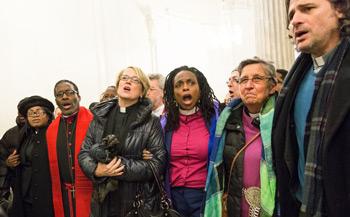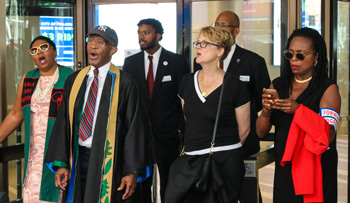
The Rev. Dr. Katharine Rhodes Henderson was named president emerita of Auburn Seminary in October, after 12 years as president. She had previously served as executive vice president and director of development. As president, she transformed the seminary into a progressive powerhouse known for its call to social justice and action – not as a traditional seminary but as a leadership, development, and research institute. In Trust’s Matt Hufman talked with her; here are five takeaways from the conversation, edited for space.
1) Get Outside of Your Lane
Often, leaders of theological institutions stay in their own lanes, the traditional lanes of the people that they talk to. My vision for Auburn was that we can talk to anybody, which is why, for example, that we had the program for ethics for corporate leaders in the ’90s. We should be petitioning legislative leaders. We should be marching and sitting on capital steps and speaking in the streets. We should be allies and accompanying people who are fighting for justice in all sorts of spaces. Early on, we called Auburn “a seminary without walls,” and I think being at the Climate Change march early in my tenure was an example. We built a physical ark that was on a flatbed truck, and we had different faith leaders and other people riding on the ark, with the idea being that we’re all in the same boat, and we all have to work together as allies.
2) Find Your Big Purpose
I think that what I’m proud of is to have built on the multifaith work that Auburn did in the ’90s, and early 2000s, of which I was a part, but then pivoting to do the work of justice. How do you create and help to build an ecosystem where there is really a multifaith movement for justice? And how do you build a multiracial, multifaith world where all belong? That’s where we’ve come in this period of time, so it was moving from a regional to a more national institution and moving from a historically Christian institution to a multifaith institution with Christian connections and history. So those were big shifts. But the idea is how do we create a more just world with lots of different partners? Because no one can do it alone. Again, that is the idea of being in lots of different public spaces outside of the usual contours or lanes that theological education operates in because God is everywhere in this world.

3) Pay Attention to What’s Around You
We became very attuned to the world around us. God is doing a new thing, do you perceive it? Not just in the world of church and theological education but in the larger world and the public and political spaces that were providing new opportunities and challenges. And that continues. So what is the public role of religious leaders, communities, institutions, and organizations in shaping the world? And how can spiritual and religious values impact the public arena? For us, it was moving into that space and not pulling away – seeing faith as an obligation and a mandate to help us shape the world in which we live more justly, which is a value that’s shared by many religious traditions. It’s leaning into that more progressive space, and not being hesitant to say that.
4) Leadership Doesn’t Have to be Lonely
This idea of “it’s lonely at the top,” I never really felt as Auburn’s president. I always felt that the board had my back and that they were able to grow in relationship to me but also to each other. And then I have had very close relationships with my staff and with members of the team. Everybody at every level in the institution realized that there was an open door and they could have conversations with me. That’s one of the beauties of being small, that there aren’t layers of hierarchy that keep you distant from each other.

5) Consider the Next Generation
I think that the generation of students who are coming into these theological institutions now – by and large – have a larger vision. I think the urgency of these times demands that institutions think very seriously about the impact they want to have, and how they’re going to use their resources well. That may mean moving into less traditional spaces and conceiving a larger role for theological institutions. Some are doing that, and I think that students will push for this too because they are going to want to be leaders for all their spaces.